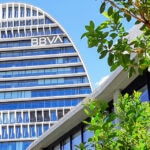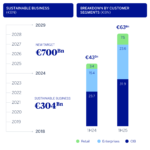BBVA channels €63 billion into sustainable business in the first half of 2025 (+48% year-on-year)
BBVA's sustainable business continues to accelerate its growth. The bank has channeled approximately €63 billion into sustainable business during the first half of 2025, representing a 48% increase compared to the same period last year. At the same time, more than €30 billion was channeled in the second quarter, a new quarterly record.

Of the total amount channeled in this half-year, 76% corresponds to projects related to climate change and natural capital (including, among others, activities linked to efficient water use, agriculture, and the circular economy) and 24% to opportunities in the social sphere, with projects that include social, educational, and health infrastructure, support for entrepreneurs and young companies, and financial inclusion.
By customer segment, the Commercial Banking division channelled €23.6 billion, representing a year-on-year increase of 53%. Within this figure, financing for natural capital reached nearly €2.34 billion, with a significant contribution from the agricultural sector in Mexico, which accounted for approximately 50% of this amount.
Corporate and Investment Banking (CIB) contributed €31.9 billion, representing year-on-year growth of 34%. The bank has continued to actively promote the financing of clean technologies and renewable energy projects in the wholesale segment, as well as offering solutions such as reverse factoring with sustainability criteria, among other strategic lines. Funding for renewable energy projects reached a value of approximately €1.6 billion.
In the retail business, BBVA channeled nearly €7.5 billion, representing year-on-year growth of 119%. Standouts in this area included digital solutions that enable customers to estimate their energy savings potential, as well as financing for hybrid and electric vehicles, which accounted for approximately €742 million.

Note: The 2029 Objective is considered to be any mobilization of financial flows, cumulatively, in relation with activities, clients or products considered to be sustainable or promoting sustainability in accordance with internal standards and market standards such as the Green Bond Principles, the Social Bond Principles, and the Sustainability Linked Bond Principles of the International Capital Markets Association, as well as the Green Loan Principles, Social Loan Principles, and Sustainability Linked Loan Principles of the Loan Market Association, existing regulations and best practices. The foregoing is understood without prejudice to the fact that said mobilization, both at an initial stage or at a later time, may not be registered on the balance sheet. To determine the financial flows channeled to sustainable business, internal criteria is used based on both internal and external information. Figures exclude BBVA Asset Management and Fundacion Microfinanzas BBVA activity.
During the quarter, BBVA was the main sponsor of the Energy Tech Summit 2025, held in Bilbao, which brought together more than 1,500 experts from the cleantech ecosystem from over 40 countries, and where it announced the first project finance in the Iberian Peninsula for a hydrogen plant powered by renewable energy. The project, which will be operational in the first half of 2026, represents a step forward in the bank's support for key technologies for decarbonization.
BBVA's strategic commitment to sustainability
BBVA aims to promote sustainability as a driver of growth and, through it, to foster new business. Climate, natural capital, and social opportunities are the three pillars on which its sustainability strategy is based. The bank has set itself a sustainable business channeling target of €700 billion from 2025 to 2029. This means more than doubling the previous target, which was to channel €300 billion between 2018 and 2025. The bank achieved this goal in December 2024, a year ahead of schedule. The new, more ambitious target is also set for a shorter period (five years instead of eight).
In parallel, BBVA continues with its transition plan to achieve Net Zero by 2050. In addition to the interim decarbonization targets for 2030 set in ten sectors (oil and gas, electricity, automotive, steel, cement, coal, aviation, maritime transport, aluminum, commercial and residential real estate), BBVA is working on setting targets in other sectors, such as agriculture.